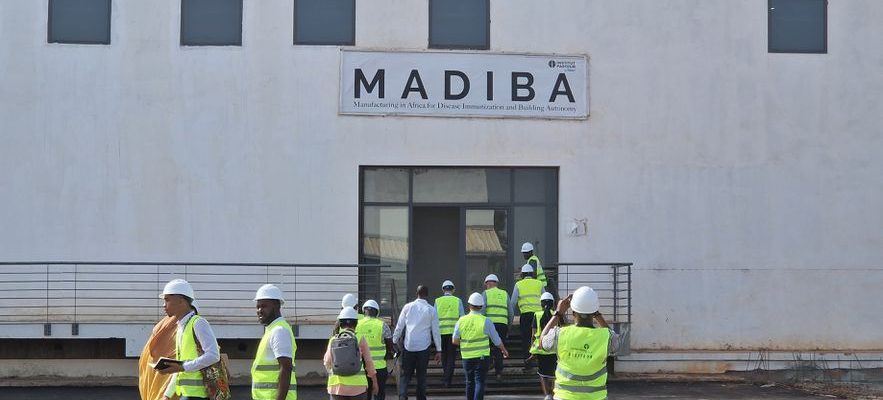At the end of a dirt road, behind the white shutters of the Abdoulaye Wade stadium, the pride of Senegal, two gray warehouses have sprung up. The last seeds of Diamniadio, the city of innovation desired by current President Macky Sall and located 30 kilometers from Dakar, these buildings will soon house a vaccine manufacturing center low cost. A first for Senegal.
Unrealistic just a few years ago, the project, which is partly based on the acquisition of messenger RNA printers, represents hope for health and the regional economy. But also an immense challenge: only 1% of vaccines injected in Africa are produced locally. With this factory, the government hopes to meet the needs of the continent and bury the humiliation of Covid: when the vaccine against the coronavirus appeared, the rich countries first allocated all the doses.
But at the beginning of October in Diamniadio, the road is still not paved. A teenager in flip-flops gets stuck in it with his cart and his donkey. The construction of the production sites and the laboratory managed by the Pasteur Institute in Dakar has encountered significant delays. The first building, dedicated to yellow fever, should have opened in 2018. It was to six-fold the production of this vaccine, which only five countries in the world have mastered and the discovery of which was made here, in Dakar, in 1927.
Significant delays
The second building, dedicated to messenger RNA, was to release 300 million doses per year from the end of 2023. It currently has no partitions, doors or windows. In addition to these difficulties on the site, Pasteur has still not received its all-in-one RNA printers with which the scientific institution hopes to reduce its costs by 50%. The company that develops them, Quantoom Biosciences, is only in the development phase. “The last stage, that of encapsulation in fat, necessary for transporting the vaccine into the body, is still the subject of work,” concedes José Castillo, its boss.
Promised for 2023, the Madiba messenger RNA vaccine production center in Senegal has fallen behind schedule
© / Antoine Beau / L’Express
However, these delays have not affected the hopes raised by this new technology. With RNA, vaccine production becomes simpler, faster, more flexible, less expensive: everything Africa is looking for. “In the event of an epidemic, in a few months and with small factories, we could be operational on a large scale,” underlines Amadou Sall, director of the Pasteur Institute in Dakar, hard hat on his head.
But the road is long for the rare African players to have entered the race, such as Pasteur Dakar, or Biovac, a relatively advanced South African start-up. Emerging countries are very dependent on the rest of the world and the war in Ukraine has made imports more difficult. What’s more, projects must adapt to Western competition. “Originally, we were to produce vaccines against Covid-19, with the support of the WHO. This is no longer relevant, because they are now abundant all over the world,” explains Dr. Sall.
Objective: Rift Fever
In Senegal, RNA technology will therefore be used as a priority to develop a vaccine against Rift Valley fever. “This virus, which says nothing to anyone in Europe, decimates livestock and is transmitted to humans. It is sensitive to climate, therefore likely to mutate in the coming years,” explains the director of the Pasteur Institute. One example among others of a typically African infection, which does not interest large pharmaceutical groups. To make a profit here, you have to sell at very low prices, where Western players prefer to focus on value creation.
Building the messenger RNA vaccine production site will cost more than $220 million. The Senegalese government has released around ten. The rest comes from the European Union, French and American development funds, and philanthropy, notably from the Bill and Melinda Gates Foundation, omnipresent in vaccine projects in emerging countries.
In Dakar, its president, the founder of Microsoft, announced Monday October 9 a new donation of 25 million dollars to accelerate the RNA project in Senegal. Twenty will go to Quantoom, and 5 to the Pasteur Institute. “Was it necessary to put so much money into a risky project, when the country is failing on the fundamentals?” asks a Dakar entrepreneur. A few kilometers from the vaccinopôle under construction, the residents of the new buildings in Diamniadio still do not have sewers. And some rural people sleep in the streets of the capital to be able to consult a doctor, due to a lack of specialists in the bush.
“Did we have to put in so much money?”
While the government is aware that the NRA will not do everything, it hopes that once completed, these production sites will prove to investors around the world that Africa is neither too unstable nor too unprofitable to finance there. pharmaceutical projects. “Producing vaccines to international standards requires a lot of logistics, procedures, regulations. This know-how will benefit Senegal, in addition to guaranteeing its sovereignty,” assures Dr. Samba Cor Sarr, head of the research division at the Ministry of Health. health.
These vaccines still need to find takers: part of the population remains reluctant to them, due to fake news and lack of awareness. Along the highway that connects Diamniadio to Dakar, where hundreds of thousands of vehicles jostle every day, a giant syringe has been drawn on a dusty wall. Inside, a greenish liquid and four words: “Africa doesn’t want it”. Amadou Sall hopes that local production will reassure residents: “Africans will be able to visit the factory, the vaccine will be made by people like them, it’s a positive dynamic.”
